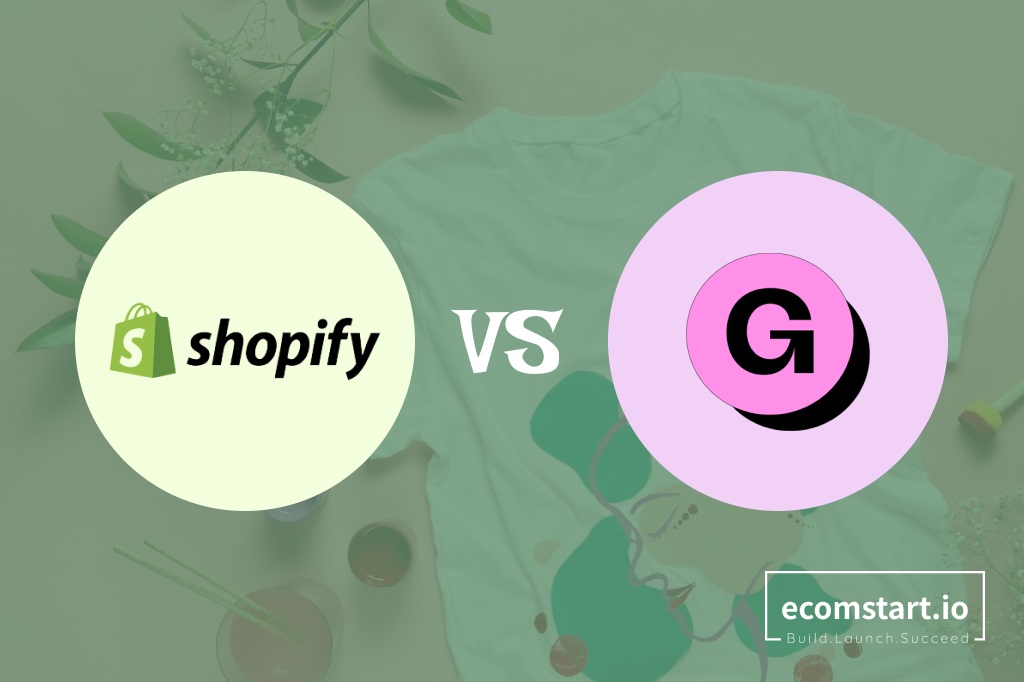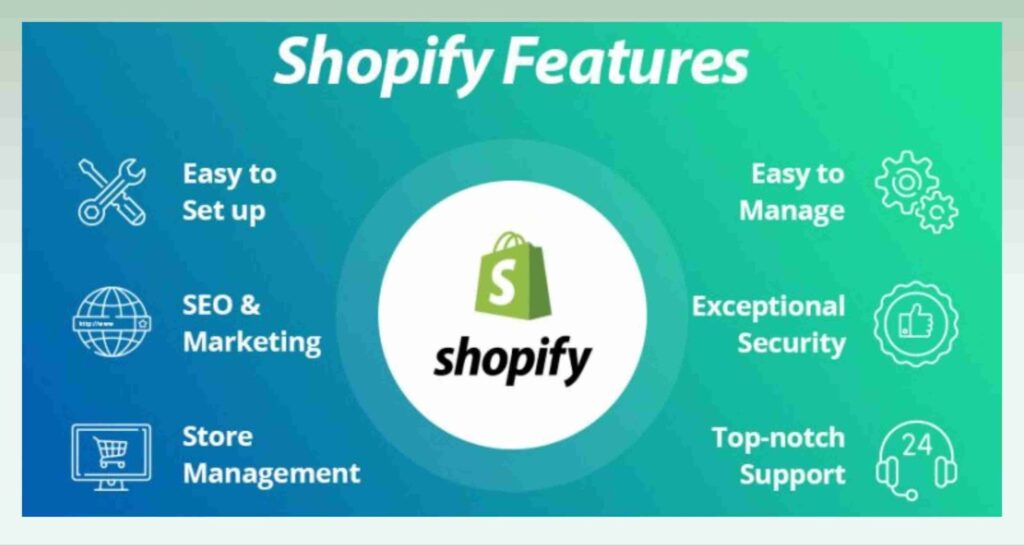Shopify vs Gumroad: Which one comes out on top?

In the eCommerce sphere, one can say that choosing correctly is a move of winning. Today, we’re tackling the big question: Gumroad vs Shopify, which one could be better? This blog post is for those of you who can’t make up your mind between these two platforms.
We are going to explore the main features, pricing policy, and overall usability of these programs so you do not take a shot in the dark. This comparison between Shopify vs Gumroad is key because it could either make or break success in your business on the web. We guarantee that the information provided will be clearly expressed, easy to understand, and able to address your concerns directly.
Let us begin then, and find the perfect fix for your eCommerce needs.
1. Shopify vs Gumroad: Overview
Let’s start with the basics: First of all, what are Shopify and Gumroad; to which function they serve?
Shopify is a full-fledged e-commerce platform that provides you with an option to establish the goods online. It allows you to manage the product line, adjust your storefront, get card payments, and track orders – a few mouse clicks is all it takes.
Now, on the other end of our Gumroad vs Shopify comparison – we have Gumroad. This is a no-fuss, easy platform that serves the purpose of making creators able to sell their work directly. Gumroad takes care of everything related to the transaction, from movies and songs down through ebooks or software while creators can move on making even more amazing things.
In essence, both platforms serve the same purpose: to assist you market your products online. However, the approach to this can be very different. And here this comparison enters the field. Further on we will also analyze these contrasts to enable you with a position that the most appropriate platform could be selected for your business goals and needs.
2. Key differences between Shopify and Gumroad
Shopify and Gumroad are both well-known e-commerce platforms, yet they target separate audiences with different requirements and budgets. This table compares key features to help you decide which one best suits your business:
| Feature | Shopify | Gumroad |
|---|---|---|
| Getting Started | Fast with guided setup | Fast and simple |
| Free Subdomain | Yes | Yes |
| Custom Domain | Yes | Yes |
| Custom Theme | Yes | No (limited branding options) |
| Extensions & Integrations | No | Yes (limited features) |
| Pricing | Flat-rate monthly subscription + transaction fees | Complex (percentage per sale + payment processing fees) |
| Transaction Fee | Yes | No |
| Payment Threshold | None | $10 minimum payout |
| Payout Schedule | Instant | Weekly |
>>> Learn more: Shopify vs Magento: Which is the #1 eCommerce Platform?
3. Gumroad vs Shopify: Full comparison
3.1. Pricing
First, let’s look at Pricing. It’s crucial for many businesses, especially those just starting out, to see who comes out on top in the Gumroad vs Shopify cost analysis.
The pricing scheme that Gumroad uses is relatively simple. It charges a 10% flat sales fee for the transactions that you make but it does not charge monthly fees. This method can work well for small businesses or everyone who checks their potential in selling a digital product. gumroad fees tiers vs shopify
Conversely, Shopify is based on a monthly subscription which has different levels and prices binging at $29 for Basic Plan, $79 for Shopify Plan and $299 for Advanced Plan (US pricing). While this may appear to be more costly at the beginning, Shopify’s rates provide you with a full set of tools and features that can assist in scaling your business.
Our verdict: There is no clear winner in the battle of Gumroad vs Shopify cost. Shopify tends to be the winner when it comes to businesses that are scalable and have monthly subscription funds. For companies that are smaller or more spanned towards digital distribution, Gumroad comes out on top as they favor pay-as-you-go pricing. In the comparison of Gumroad fee tiers vs Shopify, it’s important to weigh both platforms’ pricing and features to find the best fit for you.
3.2. Features
In terms of features, however, both Shopify and Gumroad have its own perks.
What makes Shopify stand out is the abundance of tools that facilitate the scaling process for small businesses. It provides you with a bundle of functionalities that help in creating an amazing website, which is 100% customizable within minutes. Moreover, it is also more flexible as it supports a variety of business models and scales.

On the other hand, Gumroad is more simplified and easy to use for individual creatives as well as small companies. Its primary target audience includes musicians, writers, and software companies distributing their products online such as ebooks; and music tracks since it enables them to sell through its site.
Let us consider some cases in our practical life. Gymshark, a gym clothes designer and maker, and Haus an apéritif producer are great cases of Shopify stores. They have incorporated the many powerful features of Shopify into attractive and functionally adaptable webshops.
Gumroad, on the other hand, does not emphasize large-scale online stores. Instead, it fares better in terms of promoting sales for specific types of digital items. A large number of creators make use of Gumroad in sharing their digital creations, be it e-books or music to software.
Our Verdict: It’s a draw. When it comes to robust functionality needs, the winner is Shopify for scalable businesses while championing little business or unit creators whose focus is on digital products is Gumroad.
3.3. Ease of use
Regarding the level of accessibility provided, both platforms make their distinctions.
One of the outstanding features for which Shopify receives much praise has been its user interface, as it comes incorporated with friendly design tools that are easy to work around. You can build an elegant online shop even if you have no technical skills in just a few minutes.
However, the opposite is true in Gumroad’s case. It might not be as complex as Shopify, but the simplicity of it makes Firestorm a piece of cake for small businesses or an individual content creator to handle. Indie writers, performers, and program developers are great cases of figures who use Gumroad to distribute their digital creations without having any challenges.
Our Verdict: Shopify vs Gumroad fight reached a stalemate once more. Both platforms are user-friendly and meet different user’s demands.
3.4. Help and support
In the constantly changing field of eCommerce, dependable assistance is crucial. Let us see how Shopify and Gumroad compare in this aspect.
Shopify provides a vast range of resources that are also available 24/7. You can reach them through their help center, community forum, email support, live chat, or even a phone call. Covering the key aspects, this blanket policy enables a streamlined process for businesses such as Gymshark to resolve problems timely when detected.
On the other hand, Gumroad offers assistance by using their help center and email. Though this company does not provide one-on-one support around the clock, as well as phone communication opportunities available for some other companies in their niche, their information sources leave guidelines and are easy to understand. This method is most appropriate for digital creators like indie musicians and authors who may not need 24-hour support.

Our Verdict: For the Gumroad vs Shopify throwdown, this round will be going to come out in favor of Shopify with its more well-rounded support options. Nevertheless, the two platforms remain relevant in serving their target customers adequately.
3.5. Analytics
Continuing with our conversation on assistance and support, let us now evaluate the analytics features of either system.
Shopify provides a detailed analytics dashboard to track multiple KPIs. They include the number of sales, orders, visits to the online store, rates for returning customers’ average value per order, and best-selling products. Such data is provided in graphical charts, which are very simple and understandable.
Additionally, Shopify also gives an analysis of customers’ shopping activities like adding to a cart, reach checkout, and purchase. This enables businesses to detect possible bottlenecks in the shopping process and elevate their conversion.
A practical example of a firm using Shopify analytics is the sustainable shoe brand, Allbirds. They make use of such knowledge to comprehend customers’ buying habits, and their most preferred product and hence shape up with marketing strategy accordingly too.
Conversely, Gumroad has a more basic analytics solution. There is elementary information concerning product views, likes, and purchases available for creators. Although it may lack Shopify’s in-depth analytics, this is enough for a lot of creators to understand how their product performs and what customers like.

For example, Kyle Webster works as an independent digital artist and is famous for his Photoshop brushes; he tracks the development of sales with Gumroad’s analytics. With such data, he can tell which are his hit brushes and start planning the next releases.
Our Verdict: With regards to analytical features, Shopify wins out by a whisker because its analytics are also good in that they have some level of comprehensiveness and detail.
3.6. Marketing Tool
When it comes to marketing tools, Shopify vs Gumroad has no clear winner as each has its strengths.
Shopify provides a wide array of powerful marketing tools that help to ease advertisement by the people owning the shops. Some of its features include SEO functionalities, integrations with email marketing tools, social media promotion capabilities, and the option to disseminate discount codes.
For example, an eCommerce store on Shopify that efficiently employs these tools for advertising purposes to reach out to consumers includes Kylie Cosmetics.
However, the power of Gumroad is in its simplicity. It offers elementary marketing features such as email updates and offer codes. It may not be as complete as Shopify, but it is easy to understand and pick up.
For instance, one author and software designer known as Nathan Barry uses the platform to sell his digital products while also building relationships with those in his audience.
Our Verdict: Shopify wins this round. Its wide range of marketing tools gives companies even more ways to develop and connect with their audience.
3.7. Apps & Integrations
Finally, let us conclude our comparison by discussing apps and integrations which is an important aspect of any eCommerce platform.
Shopify also has more than 4,000 apps on its app store during the time of comparison. Such apps have a huge variety of different needs that can be addressed through the provided services, from SEO improvement and competent inventory management to customer satisfaction rates or marketing automation and personalization.
Fashion Nova is a retail fashion brand that can be seen as an example of a store supported by Shopify all over the world. To improve their customer experience, they employ applications such as ‘Yotpo’ which helps to gather feedback from customers, and ‘ReConvert,’ which is used for post-purchase upselling.

However, Gumroad provides a simpler plan with less integration but the ones it offers are mostly crucial. It offers connections to the main instruments, such as MailChimp for emailing services, Google Analytics for tracking indicators, and Zapier for automatic assignments.
Even with the vast range of apps that Gumroad has, its slimness does not lose effectiveness. A representative example of such an approach is James Clear, a prolific author who sells his books and courses through Gumroad. Clear leverages the easy integration capabilities of Gumroad in ensuring that his transactions flow smoothly and the audience is kept engaged.
Our Verdict: Shopify blows Gumroad out of the water in the battle. But, in case you are all about simplicity and ease of use when it comes to integration rather than diversity, Gumroad may suit your needs.
4. Shopify vs Gumroad: The verdict
Now, after a thorough comparison, it’s time to assume the debate Gumroad vs Shopify:
Choose Shopify if you need a complete e-commerce platform with powerful features. It has up to 4,000 applications and integrations that match every imaginable requirement of an online store. It is the best way to manage a website and can be easily customized, which makes it perfect for companies that would like their online presence scaled up greatly as required.
On the flip side, choose Gumroad if you want an easy-to-use platform that doesn’t have advanced features. It offers the necessary tools to run an online store in a simplified way with a minimalist approach, through essential integrations. It is a perfect solution for creators and small business owners, as they will be able to pay more attention to creating their products instead of wasting time maintaining the online store.
In summary, there are specific advantages inherent to each of the two platforms – Shopify and Gumroad. Your choice should meet your requirements, available capabilities, and business objectives. Therefore, define your needs; weigh the advantages and disadvantages of each platform; and select one that will be suitable for developing an online store.
5. Conclusion
In conclusion, in our Shopify vs Gumroad comparison, both platforms have their advantages. If the former is primarily focused on some more complex features and provides an abundance of apps for those willing to get a complete e-commerce solution, then Gumroad does not stand aside with its simplicity. Ultimately, the choice between Shopify and Gumroad should reflect your particular business focus.
If you’re looking at other eCommerce platforms besides Shopify and Gumroad, it’s smart to check out Shopify vs other eCommerce platforms. This can help you find new options and pick the platform that suits you best.
Your eCommerce platform is simply a means to an end, and it’s how you use that tool that truly counts. For more eCommerce tips and advice visit ecomstart.io. Here at eComStart, our goal is to assist you in managing e-commerce effectively.


